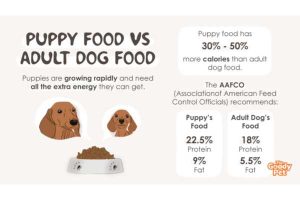Navigating the Transition: When Can Puppies Eat Adult Food?
One common concern among puppy owners is when it is appropriate to transition their puppies from a diet consisting solely of puppy food to adult food. This article aims to address this question by providing an objective and impersonal analysis of the factors that determine the right time for such a transition.

While some may argue that puppies should be introduced to adult food at a certain age, it is important to consider their nutritional needs before making any changes in their diet. Puppies have unique dietary requirements due to their rapid growth and development, necessitating a careful balance of nutrients. Therefore, understanding these nutritional needs is crucial in determining when puppies can safely consume adult food.
Additionally, consulting with a veterinarian is highly recommended as they possess the expertise needed to guide pet owners through this transitional period. By following the appropriate steps outlined in this article, pet owners can ensure a smooth and successful transition from puppy food to adult food for their furry companions.
Key Takeaways
- Puppies should be transitioned from puppy food to adult food gradually.
- A well-balanced diet is essential for the growth and development of puppies, including proteins, fats, carbohydrates, vitamins, and minerals.
- Consultation with a veterinarian is important to determine the appropriate timing for introducing adult food and to assess the specific nutritional needs of the puppy.
- Monitoring physical milestones and appetite can help determine when a puppy is ready to transition to adult food.
Understanding the Nutritional Needs of Puppies
Understanding the nutritional needs of puppies is imperative in order to ensure their optimal growth and development. A puppy’s growth is a critical phase that requires proper nourishment to support their developing body systems.
One of the key factors in promoting healthy growth is providing them with a balanced diet. A balanced diet for puppies should consist of essential nutrients such as proteins, fats, carbohydrates, vitamins, and minerals in appropriate proportions.

Proteins are crucial for muscle development, while fats provide energy and support brain development. Carbohydrates serve as a source of energy, vitamins contribute to various physiological functions, and minerals aid in bone formation and overall wellbeing.
Ensuring a puppy receives a well-balanced diet from an early age not only supports their physical growth but also promotes strong immune function and provides the foundation for a healthy adult dog.
Gradually Introduce Adult Food to Your Puppy’s Diet
To transition a puppy to a more mature diet, it is recommended to gradually introduce nourishment that aligns with their developmental needs. Introducing adult food to puppies requires careful consideration and a well-planned approach. Here are some key steps to successfully transition your puppy to adult food:
- Start by mixing small amounts of the new adult food with their current puppy food.
- Gradually increase the proportion of adult food over several days or weeks.
- Monitor your puppy’s response and adjust the ratio accordingly.
- Ensure that the adult food meets all the nutritional requirements for their age and breed.
- Consult with a veterinarian for guidance on timing and specific dietary recommendations.
By following these steps, you can ensure a smooth transition from puppy food to adult food while providing your furry friend with the necessary nutrients for optimal growth and development.
Consult with Your Veterinarian
Consulting with a veterinarian can provide valuable guidance and recommendations when it comes to transitioning your puppy’s diet and ensuring their nutritional needs are met as they grow.
It is essential to consult with a veterinarian before introducing adult food into your puppy’s diet, as they can assess the specific needs of your puppy based on factors such as breed, size, and overall health.

Puppies have different nutritional requirements than adult dogs due to their rapid growth and development. Abruptly switching from puppy food to adult food can potentially lead to nutrient deficiencies or excesses, which may impact the puppy’s growth and overall health.
A veterinarian can recommend the appropriate timing for introducing adult food based on your puppy’s individual needs, ensuring a smooth transition while avoiding any potential health risks.
Signs that Your Puppy is Ready for Adult Food
Transitioning a puppy to a more age-appropriate diet can be determined by observing specific signs that indicate they are ready for a change. One such sign is the physical development of the puppy. As puppies grow, their nutritional needs change, and their bodies require different nutrients to support optimal growth and development. Therefore, if you notice that your puppy is reaching milestones in terms of size, weight, and overall physical appearance, it may be an indication that they are ready for adult food.
Another sign to look out for is a change in appetite. Puppies tend to have smaller stomachs compared to adult dogs, so they may need to eat more frequently throughout the day. However, as they mature, their appetites may decrease, and they may start showing less interest in their puppy food. This could be an indication that they are ready for a transition to adult food.
In conclusion, monitoring your puppy’s physical development and observing any changes in appetite can help determine when it is appropriate to switch them from puppy food to adult food. It is essential to consult with your veterinarian before making any dietary changes to ensure that you are providing the best nutrition for your growing pup’s needs.
Making the Transition Smooth and Successful
A seamless and successful transition from puppy food to a more suitable diet can be achieved by carefully introducing nourishment tailored to the individual developmental needs of your growing canine companion. When making this transition, there are several tips that can help ensure a smooth process.
Firstly, it is important to gradually introduce the new food by mixing it with the old food over a period of time. This allows the puppy’s digestive system to adjust without causing any abrupt changes. Additionally, monitoring your puppy’s response to the new food is essential. Keep an eye out for any signs of discomfort or digestive issues, and consult with a veterinarian if needed. It is also crucial to provide plenty of fresh water throughout the day to aid digestion and hydration during this transition phase.

However, despite following these tips, there may still be potential challenges during this process. Some puppies may resist or show reluctance towards the new food initially. In such cases, patience and persistence are key. Gradually reducing the amount of old food while increasing the new food can help encourage acceptance over time.
Another challenge may arise if your puppy has specific dietary requirements due to health conditions or allergies. Consulting with a veterinarian can provide guidance on how best to address these unique challenges and ensure a successful transition tailored to your puppy’s individual needs.
In conclusion, transitioning puppies from their initial diet to adult food requires careful consideration and attention to their individual developmental needs. By following gradual introduction techniques and closely monitoring their response, pet owners can navigate potential challenges and achieve a seamless transition that supports their growing companion’s nourishment requirements effectively.
See also:
Discover the Benefits of Diamond Puppy Food for Your Growing Dog
NutriSource for Small and Medium Breed Puppy Food Review [2023]
Fromm Puppy Gold Premium Dry Dog Food Review [2023]
Frequently Asked Questions
Can I mix adult food with puppy food to transition my puppy to an adult diet?
Yes, you can mix adult food with puppy food to transition your puppy to an adult diet. This method allows for a gradual adjustment, ensuring the puppy receives necessary nutrients during the transition.
How long should I wait before introducing adult food to my puppy’s diet?
Introducing adult food to puppies requires a gradual transition to avoid digestive upset. To transition a puppy to an adult diet, professionals recommend waiting until the puppy is around 12 months old and gradually replacing puppy food with adult food over a period of 7-10 days.
Are there any risks associated with switching my puppy to adult food too early?
Potential health issues can arise if a puppy is transitioned to adult food too early. Risks of early transition include nutrient deficiencies, improper growth and development, digestive problems, and increased susceptibility to diseases.
Can I feed my puppy a homemade or raw food diet instead of commercial adult dog food?
Feeding puppies a homemade dog food diet can provide benefits such as control over ingredients and customization. However, a raw food diet may have potential drawbacks including the risk of bacterial contamination and nutritional imbalances if not properly formulated.
Are there any specific nutrients or supplements my puppy needs during the transition to adult food?
Supplements for puppy transition vary depending on the breed, size, and health condition. Nutritional needs during this stage include adequate protein, calcium, phosphorus, and vitamins. Consult a veterinarian for personalized recommendations to ensure a smooth transition.
You might also like read about Is Xanthan Gum Safe For Dogs
You can also read about HEART TO TAIL 15 Trays Wet Dog Food in Filet Mignon Flavor Review [2023]
